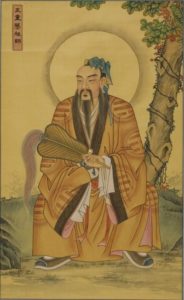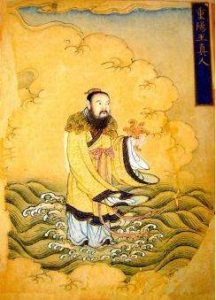Saints & Sages Part VI:
王重陽
Wang Chong Yang
(1113-1170)
_____________________________________

重阳全真。
开化辅极帝君。
-北五祖宝诰-
Double Yang – Complete Realization.
The Supreme Being of Opening Transformations &
Supporting the Bounded Finite [1].
-The Treasured Declaration of
The Northern Five Ancestors-
_____________________________________
Wang Chong Yang was the ancestral master [zu shi祖师] and founder of the Complete Realization School [2] [quan zhen全真] of Daoism, which is one of the two major schools, together with the Orthodox Unity, or Upright Oneness [zheng yi正一].He is revered as one of the Five Northern Founding Ancestors of Complete Realization [3] [quan zhen wu zu zhi yi 全镇五组之一]. His secular name was Zhong Fu [中孚] and his style name was Yun Qing [允卿]. Originally he was an imperial scholar in the Jin dynasty and later he became a military official. He changed his name to De Wei [德威], Virtous Mighty, and his style name to Shi Xiong [世雄]. Once he entered the Daoist gate his style name became Zhi Ming [知明], and his appellation Chong Yang Zi [重阳子], which is the reason why he is known as Wang Chong Yang. Wang Chong Yang [王重阳] was the disciple of Zhong Li Quan [钟离权], also referred to as Upright Yang [zheng yang 正阳] and Lü Dong Bin, also called Pure Yang [chun yang 纯阳]. Both teachers’ appellations contain Yang [阳] in their titles, thus, Wang Chong Yang was known by the name of Double Yang [chong yang 重阳]. He was also nicknamed Wang, the [One] gone Insane [wang hai feng 王害疯]. He was a resident of the capital’s Xian Yang prefecture’s Da Wei [京兆咸阳大魏 ], present day’s Shan Xi’s Xian Yang City Qin Du district [陕西咸阳市秦都区]. Seven of his disciples were important figures within the Daoist Gate, revered as the Seven Realized Ones [qi zhen七真].

Wang Chong Yang authored and left behind for posterity the following works; Wang Chongyang’s Collection on Complete Realization [wang chong yang quan zhen ji王重阳全真集], Wang Chongyang’s Treatise on Teachings & Transformations ([wang chong yang jiao hua pian王重阳教化篇 ], Wang Chong Yang’s Collection of Ten Transformations of Dividing the Pear [fen li shi hua ji王重阳分梨十化集] and Fifty Essays on Establishing the Teachings [li jiao wu shi lun立教五十论 ]. Recounted below is a paragraph from Wang Chongyang’s Collection on Complete Realization [wang chong yang quan zhen ji王重阳全真集], where Wang Chong Yang has a mystic encounter with one of the Eight Immortals:
余尝从甘河携酒一葫,欲归庵,道逢一先生叫云:‘害风,肯与我酒吃否?’余与之,先生一饮而尽,却令余以葫取河水;余取得水,授与先生,先生复授余,令余饮之,乃仙酎也。又曰:‘子识刘海蟾否?’余曰:‘但尝见画像
耳。’先生笑之而去。”还暗示所遇至人为刘海蟾。
I once carried a bottle gourd of wine from Gan He, [with] the desire to return to [my] hut. On the path [I] encountered a teacher who called out [to me]:
Insane [One], are you willing to consume alcohol with me or not?
I drank the cup in one gulp together with [this] teacher. However, he ordered me to fetch water with the gourd; [After] I had fetched the water and conferred [it] to the teacher, [he] once more commanded me to drink [it], consequently [it] was Immortal Wine [4]. [He] also said:
[Does] the son recognize Liu Hai Chan or not?
I said:
[I] have merely once seen a painted portrait [of him].
The teacher laughed and left. Even more so hinting that the person whom [I] had met was Liu Hai Chan.
It has been recorded that Wang Chong Yang quit drinking alcohol in the aftermath of this event.
[1] The word Bounded Finite [ji 极] in Chinese is also part of Tai Ji [太极], the Great Bounded Finite, and Wu Ji [无极] the Boundless Infinite.
[2] The name Complete Realization is often translated as Complete Reality or Complete Perfection. Taking a closer look Zhen [真] , it reveals the meaning of the Truth, a higher Truth. The author felt that reality in the English does not accurately reflect this concept and, therefore, chose a different terminology.
[3] The Five Northern Founding Ancestors of Complete Realization are Lü Dong Bin [吕洞宾], Zhong Li Quan [钟离权], Dong Hua Di Jun [东华帝君] , Liu Hai Chan [刘海蟾] and Wang Chong Yang [王重阳].
[4] Komjathy in Cultivating Perfection: Mysticism and Self-transformation in Early Quanzhen Daoism translated Immortal Wine [xian zhou 仙酎] as Brew of the Immortals. Zhou [酎] generally stands for repeatedly fermented, strong wine.
______________________________________________
Post-Scriptum: This article will appear in the appendix of Purple Cloud Press’ forthcoming publication of 《The 49 Barriers of the Cultivation of the Dao》 by Xing De, a manual for refining Inner Nature based on Liu Yiming’s 50 Barriers
Would you like to subscribe to our newsletter?
If you enjoyed reading this please consider supporting us!
When we started the Purple Cloud Institute, our aim was to make accessible educational material about traditional Chinese cultural practices. We strive to keep prices of our books as affordable as possible and the content we provide free of charge. However, there are many ongoing behind the scenes costs and the time taken to provide such content is considerable.
If you have enjoyed our offerings please consider donating and supporting us. The help will allow us to make time to bring you more in the way of book publications, podcasts and videos about tradition-based Daoist, Chinese medicine and martial arts and help keep these traditions alive.
Your assistance is greatly appreciated!
